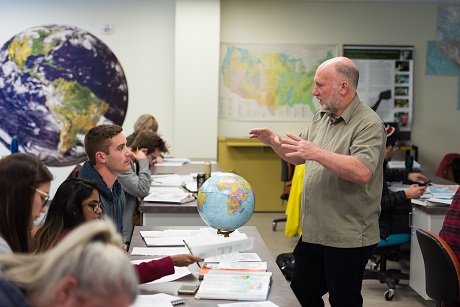Going Far Beyond the Map
Geography studies at COCC explore cultures, climates and connections
The jungle is no place to swing a baseball bat.
When Mick McCann teaches his Cultural Geography class at Central Oregon Community College (COCC), the associate professor uses “baseball diffusion”—the outward ripple of the sport
from its American origins—to examine how factors like language and landscape have
played a part in its export to other places.
“There’s a reason for where it spread to, and where it didn’t,” he said, citing Cuba,
with its prior connections to the U.S., as an original incubator of talent. “In Cuba,
after the revolution, players scattered and went to places close by—the Dominican
and Puerto Rico. They were always crazy about it in Nicaragua (where U.S. troops helped
push its popularity).”
But while the Dominican Republic, for instance, is big on baseball, Haiti—its connected
neighbor—is quite the opposite. The French-speaking nation was a tough fit for Spanish-speaking
exiles. An easy “out,” so to speak.
Farther south, the terrain and wet jungles kept the sport from pushing much beyond
Colombia. McCann, sitting in his office on the Bend campus, ran a finger over a map
of South America illuminated on his computer screen. “It never really spread this
far south,” he added, letting his finger drift off the screen over Brazil.
In McCann’s office, the conditions are intriguing. A sizable fur hat from Uzbekistan sits like a tamed animal on a shelf. His recent summiting of Kilimanjaro, an eight-day schlep that ascended into thick clouds, is captured in a photo. Maps are rolled and ready. Several flags—like the bold blue and white stripes of Nicaragua, which backdrop his desk—hang as art. In all, he’s visited 48 countries.
“It’s about understanding the world that we live in,” he said. “And it’s about conditions in ‘this place’ affecting conditions in ‘that place.’”
Being a geographer means forever battling a rather stagnant notion—that the subject
boils down to place-names and country shapes. McCann will often forgo using the word
“geography” at all when chatting about his area of study with new students, hoping
to avoid its dusty, cut-and-dry connotations.
At COCC, students discover a curriculum that goes far beyond the map. The program
is small—just McCann and part-time instructor David Welk—but they pack in a lot. Topics
range from economic development and world religion to climate effects and issues of
sustainable land-use. A course called World Regional Geography, for instance, dips
“a mile wide and a foot deep” into ecosystems and cultures around the globe.
Always, there’s a focus on experiential learning. Out at R.E. Jewell Elementary School
in Bend, a larger-than-life, colorful U.S. map fills a wide patch of playground asphalt.
COCC geography students painted it there, freehand, using grids and snapped chalk
lines, as part of their class. School kids run across it or fling things onto the
map, targeting states while (unknowingly) learning their locales. At another school,
the college students inventively used a sizable hunk of lava rock—placed way off to
the side—to represent Hawaii.
It makes McCann smile, thinking of the scene. “I think every school should have one,”
he said. “You’re incorporating geography into play—you’re stealth teaching.” The painter-geographers
will head to Bend International School this spring.
COCC students who are considering careers in geography—say, as a city planner, policy
consultant or natural resources researcher—can work toward an Associate of Arts Oregon Transfer degree with a geography concentration. Current student John Franzwa is planning on utilizing
his studies in a museum curator career. “Geography blends all the physical sciences,
and gives you a better view of the world, or even your neighborhood,” he said. The
college also offers a degree and certificate in Geographic Information Systems (GIS).
Jason Gruetzmacher earned a degree at the college and now teaches language and social
studies at Redmond’s Elton Gregory Middle School. He recalled how his perception of
geography evolved at COCC. “I moved from viewing geography as a static discipline
to understanding that geography is dynamic,” he said. “And that to comprehend it wholly,
there are different lenses which need to be used to view it through.”
That broad view is a big part of a class called Field Geography of Central Oregon.
Traveling by van and on foot—notebooks in hand—class members find a fieldtrip that
won’t quit. “We go hiking, we look at different communities, we look at physical geography,
we look at land forms,” said McCann. Week by week, the class explores the region,
from Paulina Peak to the Warm Springs Reservation, discussing things like economic
zoning and social structure. It’s an eye-opening course, a springboard for wider studies.
For those looking to widen their studies internationally, McCann (who also holds
a Spanish degree) will be conducting geography classes in Barcelona this fall as part
of COCC’s Study Abroad program. It’s a chance for students to live with host families and learn directly from picturesque
fieldtrips, visits to European consulates and rail travels. As it turns out, Spain
has a national baseball team.
For more details, visit the geography program at Central Oregon Community College or call 541-383-7700.
By Mark Russell Johnson, COCC College Relations

